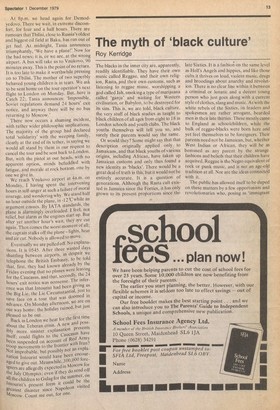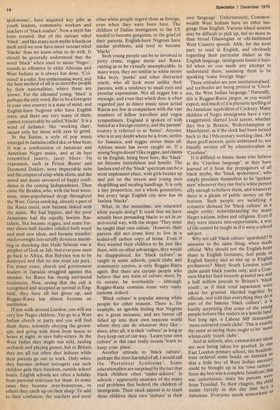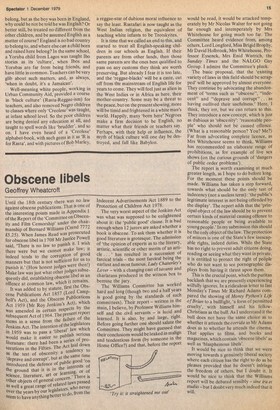The myth of 'black culture'
Roy Kerridge
The blacks in the inner city are, apparently, readily identifiable. They have their own music called Reggae, and their own religion, Rasta, and their own customs, such as listening to reggae music, worshipping a god called Jah, smoking a type of marijuana called `ganja' and waiting for Western civilisation, or Babylon, to be destroyed for its sins. This is, we are told, black culture, the very stuff of black studies as taught to black children of all ages from eight to 18 in London schools and youth clubs. The black youths themselves will tell you so, and surely their parents would say the same.
Or would they? Some might say that that description originally applied only to Jamaicans, and that black youths of various origins, including African, have taken up Jamaican customs and only thus found a new identity as 'blacks'. There would be a great deal of truth in this, but it would not be entirely accurate. It is a question of generations. Although the Rasta cult existed in Jamaica since the Forties, it has only grown to its present proportions since the late Sixties, It is a fashion. on the same level as Hell's Angels and hippies, and like those cults it thrives on loud, violent music, drugs and broodings about anarchy and revolution. There is no clear line within it between a criminal or lunatic and a decent young person who just goes along with a current style of clothes, slang and music. As With the white rebels of the Sixties, its leaders and spokesmen are rather arrogant, bearded men in their late thirties. These mostly came to England as schoolchildren, while the bulk of reggae-blacks were born here and yet feel themselves to be foreigners. Their parents need not be Jamaican, but, whether West Indian or African, they will be as bemused as any parent by the strange fashions and beliefs that their children have acquired. Reggae is the Negro equivalent of rock or punk music, and is not an age-old tradition at all. Nor are the ideas connected with it.
The public has allowed itself to be duped on these matters by a few opportunists and revolutionaries who, posing as 'immigrant spokesmen', have acquired key jobs as youth leaders, community workers and teachers of 'black studies'. Now a myth has been created, that of the outcast rebel 'black', and like many such myths it feeds on itself until we now have more outcast rebel 'blacks' than we know what to do with. It should be generally understood that the word 'black' when used to mean 'Negro', sounds as offensive to older Africans and West Indians as it always has done. 'Coloured' is a safer, less embarrassing word, and the best method of all is to describe people by their nationalities, where these are known. For the alienated young, 'black' is perhaps the only word. But to be a foreigner in your own country is a state of mind, and English-born Negroes who have English ways, and there are very many of them, cannot conceivably be called 'blacks'. It is a word of defiance, like 'working class', meant only for those with axes to grind.
In the Sixties, a style of pop music emerged in Jamaica called ska, or blue beat. It was a combination of Jamaican and American Negro music, and at its best resembled jaunty, jazzy blues. Its exponents, such as Prince Buster and Desmond Dekker, wore inweccable suits and the crispest of crisp white shirts, and the mood and music savoured of happy confidence in the coming Independence. Then came the Beatles, who, with the best intentions, mass-popularised drugs throughout the West. Ganja-smoking, already a part of the Rasta creed, now became linked with the music. We had hippies, and the poor Jamaicans had the equally lawless Rastafaris, Ska became reggae, and some former dance-hall dandies inhaled both weed and mad new ideas, and became transformed overnight into scruffy devotees mumb ling or shrieking that Haile Selassie was a prophet of God, or Jah, that everyone must go back to Africa, that Babylon was to be destroyed and that no one must eat pork. For many years, church and government leaders in Jamaica struggled against this menace, for Rasta has strong anti-social tendencies. Now, seeing that the cult is recognised and accepted as normal in England, they have all but given up, and Reggae-Rasta has almost become an institution.
If you walk around London, you will see very few Negro children. Yet go to a West indian church or party and you will find them there, solemnly obeying the grownups, and going with them from house to house at night, to save baby-sitters. In the West Indies they might run wild, raiding orchards and playing games, but in Britain they are all too often shut indoors while their parents go out to work. Only when they become defiant teenagers can such children gain their freedom, outside school hours. English schools are often a holiday from parental strictness for them. In some cases they become over-boisterous, in others they catch up on their sleep. To add to their confusion, the teachers and most other white people regard them as foreign, even when they were born here. The children of Italian immigrants to the US tended to become gangsters, to the grief of their parents. English-born Negroes have similar problems, and tend to become 'blacks'.
Such young people can be so involved in petty crime, reggae music and Rasta ranting as to be virtually unemployable. In many ways, they are similar to white motor bike boys, 'punks' and other distracted youth, who all look most unlike their parents, with a tendency to small eyes and peculiar expressions. Not all reggae has a message, and even that which does is often regarded just as dance music since actual Rastas are few in comparison with the vast numbers of fellow travellers and vague sympathisers. England is spoken of with hatred as a foreign country, and the parents' country is referred to as 'home'. Anyone who is in any doubt where he is from, settles for Jamaica, and reggae unites them all.
African music has never caught on. If a young Negro doesn't like reggae, and claims to be English, being born here, the 'black' set become incredulous and hostile. The lawless end of the 'black' spectrum can be a most unpleasant place, with girls beaten up and put on the streets and young men shoplifting and stealing handbags. It is only a tiny proportion, not a whole generation, but every large English city now has its lawless 'blacks'.
What, in the meantime, are educated white people doing? It seem that we have actually been persuading blacks to act in an anti-social way, with the slogan 'They must be taught their own culture.' However, their parents did not come here to live in a sealed-off carbon copy of home. Even if they wanted their children to be just like them, with no other advantages, they would be disappointed, for 'black culture' as taught in some schools, youth clubs and community centres, is only Reggae-Rasta again. But there are certain people who believe that any form of culture must, by its nature, be worthwhile — although Reggae-Rasta contains some very nasty customs indeed.
'Black culture' is popular among white people for other reasons. There is, for example, an ignoble feeling that Negroes are a great nuisance, and are better off tidied up into their own separate world where they can do whatever they like — since, after all, it is their 'culture' as long as they keep out of our way. 'Learn your own culture' in this case really means 'learn to keep your place'.
Another attitude to 'black culture', perhaps the most harmful of al1,1 would call the 'Pestalozzi Syndrome'. Some educationalists are surprised by the tact that black children often 'under-achieve' in schools apparently unaware of the many real problems that bedevil the children of immigrants. Their stock answer is to teach these children their own 'culture' in their own 'language'. Unfortunately, Commonwealth West Indians have no other lan guage than English. Various island accents may be difficult to pick up, but no more so than broad Glaswegian or old-fashioned West Country speech. Able, for the most part, to read in English, and obviously regarding their particular dialect as the English language, immigrants found it hurtful when no one made any attempt to understand them, assuming them to be speaking 'some foreign lingo'.
These attitudes are now institutionalised, and textbooks are being printed in 'Creol ese, the West Indian language.' Naturally, this is Reggae-Rasta jargon, as you would expect, and much of it is phonetic spelling of the Jamaican equivalent of Cockney. Many children of Negro immigrants have a very exaggerated, slurred local accent, whether they live in Brixton, Wolverhampton or Manchester, as if the clock had been turned back to the 19th-century working class. All these gruff accents, quite unlistened to, are blandly written off by educationalists as 'Creolese'.
It is difficult to blame those who believe in the 'Creolese language', as they have learned of it from the propagators of all black myths, the 'black spokesmen', who simply proclaim themselves to be 'spokes men' whenever they can find a white person silly enough to believe them, and whenever there is a gleam of public money on the horizon. Such people are satisfying a romantic demand for 'black culture' as a single entity, notwithstanding the many Negro nations, tribes and religions. Even if they were sincere non-opportunists, a way of life cannot be taught as if it were a school subject. Why not call 'black culture' apartheid? It amounts to the same thing, when made official. Why should not the English-born share in English literature, feel pride in English history and so rise up in English professions? Many South London youth clubs admit black youths only, and a Common Market fund recently granted two and a half million pounds to Britain's 'black youth', as if their total separation were taken for granted. Herded together by officials, and told that everything they do is part of the famous 'black culture', it is hardly surprising that some of the young people behave like raiders in a hostile land. Not long ago, a Labour MP demanded 'more coloured youth clubs'. This is exactly the same as saying there ought to be `more whites-only youth clubs'. And in schools, also, extraordinary ideas are now being taken for granted. In one East London primary school, the headmis' tress ordered some books on Jamaica so that a little boy of West Indian ancestry could be brought up in his 'own culture:. Soon the boy was a complete Jamaican; this was unfortunate, since his parents Were from Trinidad. To their chagrin, the child insists fiercely to this day that he's tial Jamaican. Everyone needs somewhere belong, but as the boy was born in England, why could he not be told he was English? Or better still, be treated no different from the other children, and be assumed English as a matter of course? England is no bad country to belong to, and where else can a child born and raised here belong? In the same school, a Yoruba child from Lagos was taught Ibo stories as its 'culture', when Ibos and Yorubas are far from being friends, and have little in common. Teachers can be very glib about such matters, and, as always, 'when in doubt, it's a Jamaican'.
Well-meaning white people, working in Urban Community Aid, provided a course in 'black culture' (Rasta-Reggae-ism) for teachers, and also removed Negro children to classes where only 'Creolese' was taught, at infant school level. So the poor children are being denied any education at all, and taught to spell words like 'brudder', and so on. I have even heard of a 'Creolese' alphabet-book, with such gems in it as '12 is for Rasta', and with pictures of Bob Marley, a reggae-star of dubious moral influence to say the least. Rastafari is now taught as the West Indian religion, the equivalent of teaching white infants to be Trotskyites.
It is time that we called an end to this, and started to treat all English-speaking children in our schools as English. If their parents are from other lands, then those same parents are the ones best qualified to pass on any customs they think are worth preserving. But already I fear it is too late, and the 'reggae-blacks' will be a caste, cut off from the mainstream of English life for years to come. They will feel just as alien in the West Indies or in Africa as here, their mother-country. Some may be a threat to the peace, but on the present showing, more will be timid and frightened in a white man's world. Happily, many 'born here' Negroes make a firm decision to be English, no matter what their friends or teachers say. Perhaps, with their help or influence, the myth of black culture will one day be destroyed, and fall like Babylon.













































 Previous page
Previous page